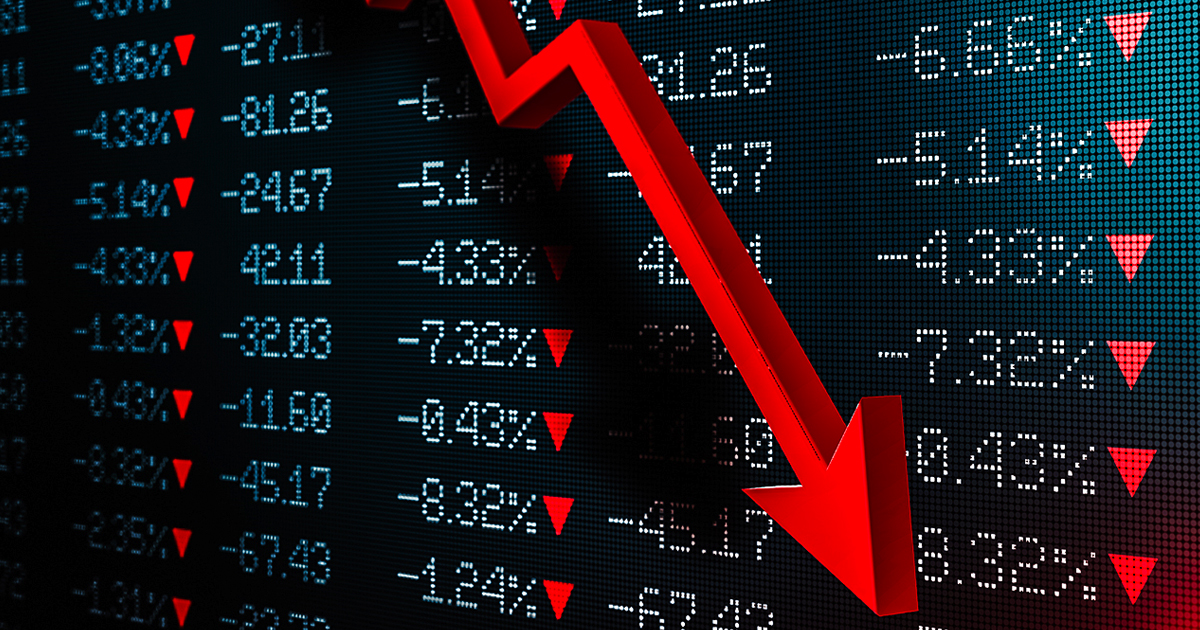Recession Fears Grow; Market Wipes Out Nearly $3 Trillion in 1 Day
05.08.2024 9:56 1 min. read Kosta Gushterov
Financial analysts say fears of a global recession have risen after a dramatic $2.9 trillion drop in stock market values.
The drop, reported on August 2, 2024, is the biggest since March 16, 2020, when the COVID pandemic sparked similar concerns.
Jacob King, a financial analyst, highlighted that major stock indices have suffered serious losses due to growing recession fears. This decline was triggered by disappointing U.S. employment data, which showed slower job growth and rising unemployment—the highest since October 2021. In addition, the weak performance of the U.S. manufacturing sector and weak earnings at semiconductor giant Intel worsened the situation.
On this turbulent day, the major world indices fell significantly. The S&P 500 index, tracking the 500 largest U.S. companies, faced its worst session in nearly two years. The Nasdaq Composite dropped 2.6%, and the Dow Jones Industrial Average fell 2%, or 820 points. Prominent technology stocks were hit hard, with Amazon shares plunging 12.5% on missed earnings expectations and a dismal forecast. Intel shares fell 29%, and Nvidia also saw a significant decline on the day.
Deutsche Bank’s Jim Reed noted that the recent decline reflects rising risk sentiment in the market, exacerbated by weak U.S. economic data and disappointing technology earnings. This global market decline underscores widespread concern about a potential economic slowdown.
-
1
Billionaire Slams Meme Stock Hype and Sounds Alarm on U.S. Fiscal Health
15.06.2025 18:00 2 min. read -
2
Robert Kiyosaki Predicts 2025 “Super-Crash,” Urges Hoarding Gold, Silver, and Bitcoin
23.06.2025 13:31 2 min. read -
3
Billionaire Investor Sees Dollar Crash If Key Support Breaks
18.06.2025 15:00 1 min. read -
4
Nassim Taleb Says Global Trust Is Shifting from the Dollar to Gold
22.06.2025 17:00 1 min. read -
5
U.S. Recession May Already Be Locked In, Economist Warns
23.06.2025 12:00 1 min. read
Robert Kiyosaki Predicts When The Price of Silver Will Explode
Robert Kiyosaki, author of Rich Dad Poor Dad, has issued a bold prediction on silver, calling it the “best asymmetric buy” currently available.
U.S. PCE Inflation Rises for First Time Since February, Fed Rate Cut Likely Delayed
Fresh data on Personal Consumption Expenditures (PCE) — the Federal Reserve’s preferred inflation gauge — shows inflation ticked higher in May, potentially delaying the long-awaited Fed rate cut into September or later.
Trump Targets Powell as Fed Holds Rates: Who Could Replace Him?
Federal Reserve Chair Jerome Powell is once again under fire, this time facing renewed criticism from Donald Trump over the Fed’s decision to hold interest rates steady in June.
U.S. National Debt Surge Could Trigger a Major Crisis, Says Ray Dalio
Billionaire investor Ray Dalio has sounded the alarm over America’s soaring national debt, warning of a looming economic crisis if no action is taken.
-
1
Billionaire Slams Meme Stock Hype and Sounds Alarm on U.S. Fiscal Health
15.06.2025 18:00 2 min. read -
2
Robert Kiyosaki Predicts 2025 “Super-Crash,” Urges Hoarding Gold, Silver, and Bitcoin
23.06.2025 13:31 2 min. read -
3
Billionaire Investor Sees Dollar Crash If Key Support Breaks
18.06.2025 15:00 1 min. read -
4
Nassim Taleb Says Global Trust Is Shifting from the Dollar to Gold
22.06.2025 17:00 1 min. read -
5
U.S. Recession May Already Be Locked In, Economist Warns
23.06.2025 12:00 1 min. read


